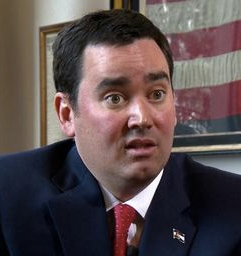 June 25, 2018 06:03 AM UTC
June 25, 2018 06:03 AM UTC
(Promoted by Colorado Pols)

How could little old you possibly make a big-ass political candidate comply with Colorado’s campaign finance and disclosure laws?
In a blog post last week, I showed you, step-by-step, how simple it is to file a complaint under new rules announced Tuesday by Colorado Secretary of State (SOS) Wayne Williams.
On Thursday, to make explaining the new process more tangible and understandable, I filed a sample complaint, apparently the first test-case for the SOS’ new rules, about a possible campaign-disclosure violation by Colorado Treasurer Walker Stapleton, who’s running for governor in the Republican primary.
So here’s where things stand?
“The Elections Division will make an initial determination regarding the complaint within 10 business days,” the SOS’ office notified me via email Thursday just hours after receiving my complaint.
How exciting!
My complaint has been given a name, “Salzman v. Stapleton.” That sounds a bit scary to me, to be honest, since I don’t have a lawyer doing this like Stapleton surely will, but the process is designed to allow anyone to have a fighting chance.
Here’s what will happen next, as beautifully described in the SOS’ new rules.
The SOS can 1) dismiss my case and send me an explanation. 2) It can investigate further, or… 3) if the SOS believes I’ve made a “legal and factual” argument that Stapleton illegally left his wife’s $30,000 income off his disclosure form, the Elections Division will contact Stapleton and essentially ask, what’s up, dude?
The SOS would give Stapleton ten days to “cure” the problem, in this case by listing Jenna Stapleton’s $30K on his disclosure form. Stapleton would be asked to fill out a form stating his intent to do so.
If the SOS determines that the “respondent,” in this case Stapleton, fixes the problem in “good faith,” the complaint process can come to an end at this point, according to the rules.
If Stapleton is found in violation of the law, and he disagrees with the SOS, then, after further SOS review, the case could be referred to a hearing officer, a process that I’ll blog about later, whether this happens to Stapleton or not.
For now, everything seems fairly clear, but I was left with two questions, which I submitted to Lynn Bartels of Williams’ office.
These may be dumb questions, because I’m not a lawyer and I have zero experience filing campaign complaints myself.
But, as I explained to the SOS, I’m trying to educate folks about the process, so why not ask?
If the respondent, in this case Stapleton, agrees that he or she has violated the law as alleged, and he or she cures the violation in accordance with your rules, does your office have the power to assess fines or penalties for the time period during which he or she was out of compliance with the law, if such fines or penalties are applicable? If so, how would you decide whether to do this– and who would decide the size of the fines and the penalties to assess?
Under my reading of the law, in the sample Stapleton case, Stapleton’s lack of compliance could possibly subject him to fines of $50 per day or possibly misdemeanor charges and additional fines.
If the respondent, in this case Stapleton, agrees that he or she has violated the law as alleged, and he or she fixes the violation in accordance with your rules, does your office ask the respondent for an explanation for the violation? Do you have the option to do so, even if the question of why the lapse occurred is not included on the form to be filled out by the respondent?
To my way of thinking, the public is owed an explanation by a candidate as to why he or she violated a campaign finance or disclosure law. It’s great that the law allows candidates to fix his or her lapses, because we all make mistakes.
But if elected, a candidate would become a powerful lawmaker who might not be able to “cure” a mistake and therefore might kill, maim, fleece, or otherwise hurt hundreds or millions of innocent citizens. I’m not saying a campaign-disclosure violation presages a disastrous political leader. But some transparency about why the error happened should be required. But something tells me it isn’t. But we will see.
In our Stapleton example, if it turns out he in fact broke the law, he could offer different explanations for the failure to disclose Jenna Stapleton’s income. These could range from a clerical oversight or poor legal representation to simply forgetting about his wife’s $30,000 amid all his other income. The people would benefit from knowing what Stapleton, or any guilty politician, would have to say.
So now I’ll wait for answers to these questions and for the SOS’ office to essentially vet my case and decide whether to move ahead or toss it out.
But again, my point here is about illuminating the new process, not about Stapleton.
l’m hoping this inspires you to cast off the chains of any fear you might have about filing a campaign finance complaint against a state candidate, no matter what side of the aisle you are on.
We need each other to keep democracy healthy. Truly.
Subscribe to our monthly newsletter to stay in the loop with regular updates!
Comments